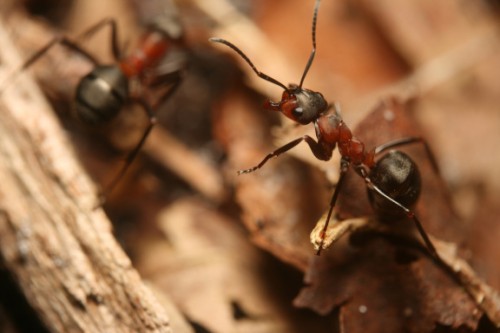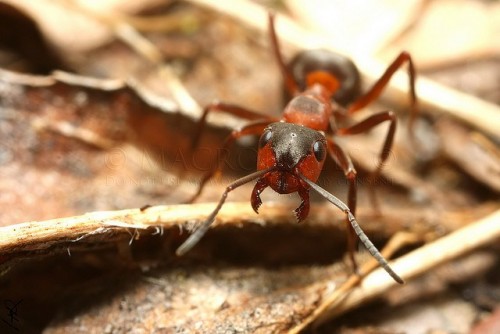How ‘small’ science can produce big thoughts.
The internet is generally a wasteland of cat memes and political invective. Once in a while it serves its original purpose in disseminating new ideas. I stumbled across Boris Ryabko‘s little corner of the web while researching compression learning algorithms (which, BTW, are much more fundamental and important than crap like ARIMA). In it, I found one of the nicest little curiosity driven papers I’ve come across in some time. Ryabko and his coworker, Zhanna Reznikova, measured the information processing abilities of ants, and the information capacity of ant languages. Download it here. There was also a plenary talk at an IEEE conference you can download here.
In our degenerate age where people think cell phone apps are innovations, it is probably necessary to explain why this is a glorious piece of work. Science is an exercise in curiosity about nature. It is a process. It sometimes involves complex and costly apparatus, or the resources of giant institutes. Sometimes it involves looking at ants in an ant farm, and knowing some clever math. Many people are gobsmacked by the technological gizmos used to do science. They think the giant S&M dungeons of tokomaks and synchro-cyclotrons are science. Those aren’t science; they’re tools. The end product; the insights into nature -that is what is important. Professors Ryabko and Reznikova did something a kid could understand the implications of, but no kid could actually do. The fact that they did it at all indicates they have the child-like curiosity and love for nature that is the true spirit of scientific enquiry. As far as I am concerned, Ryabko and Reznikova are real scientists. The thousands of co-authors on the Higgs paper; able technicians I am sure, but their contributions are a widows mite to the gold sovereign of Ryabko and Reznikova.
Theory: ants are smart, and they talk with their antennae. How smart are they, and how much information can they transfer with their antennae language? Here’s a video of talking ants from Professor Reznikova’s webpage:
Experiment: to figure out how much information they can transfer, starve some ants (hey, it’s for science), stick some food at random places in a binary tree, and see how fast they can tell the other ants about it. Here’s a video clip of the setup. Each fork in the path of a physical binary tree represents 1 bit of information, just as it does on your computer. Paint the ants so you know which is which. When a scout ant finds the food, you remove the maze, and put in place an identical one to avoid their sniffing the ant trails or the food in it. This way, the only way for the other ants to find the fork the food was in is via actual ant communication. Time the ant communication between the scout ant and other foragers (takes longer than 30 seconds, apparently). Result: F. sanguinea can transmit around 0.74 bits a minute. F. polyctena can do 1.1 bits a minute.
Experiment: to figure out if ants are smart, see if they can pass on maze information in a compressed way. LRLRLRLRLRLR is a lot simpler in an information theoretical sense than an equal length random sequence of lefts and rights. Telephone transmission and MP3 players have this sort of compression baked into them to make storage and transmission more efficient. If ants can communicate directions for a regular maze faster than a random one, they’re kind of smart. Result: in fact, this turns out to be the case.
Experiment: to find out if ants are smart, see if they can count. Stick them in a comb or hub shaped maze where there is food at the end of one of the 25 or more forks (you can see some of the mazes here). The only way the poor ant can tell other ants about it is if he says something like “seventeenth one to the left.” Or, in the case of one of the variants of this experiment, something more like”3 over from the one the crazy Russian usually puts the food in.” Yep, you can see it plain as pie in the plots: ants have a hard time explaining “number 30″ and a much easier time of saying, “two over from the one the food is usually in.” Ants can do math.
The power of information theory is not appreciated as it should be. We use the products of it every time we fire up a computer or a cell phone, but it is applicable in many areas where a mention of ‘Shannon entropy‘ will be met with a shrug. Learning about the Empire of the Ants is just one example.
People in the SETI project are looking for alien ham radios on other planets. I’ve often wondered why people think they’ll be able to recognize an alien language as such. Sophisticated information encoding systems look an awful lot like noise. The English language isn’t particularly sophisticated as an encoding system. Its compressibility indicates this. If I were an alien, I might use very compressed signals (sort of like we do with some of our electronic communications). It might look an awful lot like noise.
We have yet to communicate with dolphins. We’re pretty sure they have interesting things to say, via an information theoretical result called Zipf’s law (though others disagree, it seems likely they’re saying something pretty complex). There are better techniques to “decompress” dolphin vocalizations than : I use some of them looking for patterns in economic systems. Unfortunately marine biologists are usually not current with information theoretical tools, and the types of people who are familiar with such tools are busy working for the NSA and Rentech. Should I ever make my pile of dough and retire, I’ll hopefully have enough loot to strap a couple of tape recorders to the dolphins. It seems something worth doing.
The beautiful result of Ryabko and Reznikova points the way forward. A low budget, high concept experiment, done with stopwatches, paint and miniature plastic ant habitrails produced this beautiful result on insect intelligence. It is such a simple experiment, anyone with some time and some ants could have done it! This sort of ‘small science’ seems rare these days; people are more interested in big budget things, designed to answer questions about minutae, rather than interesting things about the world around us. I don’t know if we have the spirit to do such “small science” in America any longer. American scientists seem like bureaucratized lemmings, hypnotized by budgets, much like the poor ants are hypnotized by sugar water. The Rube-Goldberg nature of this experiment could only be done by a nation of curious tinkerers; something we no longer seem to have here.
Dolphin language could have been decoded decades ago. While it is sad that such studies haven’t been done yet, it leaves open new frontiers for creative young scientists today. Stop whining about your budget and get to work!













Thank you. What a wonderful, wonderful post. I’ve spent a lot of time challenging scientism in the blogosphere, but I’ve always told myself (nervously) I was doing so without disrespecting the beauty of the impulse to inquiry, the single-minded commitment and the marvel at discovery that drives the scientific mind. Dabblers, all hail Scott for so artfully illustrating one of the glories of the West.
I haven’t opened all your links, Scott, but I am praying none of them contain claims by the distinguished sages that the world of ant communications holds important lessons for conflict reduction among humans or modern educational techniques.
I think the mark of a Dabbler is a gentle distrust of all those who seem a bit too keen about their chosen religion/science/theory etc!
very very interesting read Scott – I guess ant behaviour in general must be quite fun to study as they always do the same thing in lines like little mobile bits of morse code, so there’s all sorts of things you can measure
Smart ants? I for one welcome our new insect overlords.
I wonder how one can encourage the practice of this sort of science? It seems a thoroughly good thing from just about every perspective.
I wish I could figure out how to encourage such research, but the best I am able to come up with is being Russian and in Siberia seems to have something to do with it. Old school inventors and scientists had this sort of pluck, probably from growing up on farms where you had to fix the generator.
The links are guaranteed to contain no glad-handling boobs trying to sell you something.
Hi, I believe your site may be having internet browser
compatibility problems. Whenever I take a look at your web site in Safari,
it looks fine however, when opening in I.E., it’s got some overlapping issues. I merely wanted to give you a quick heads up! Aside from that, fantastic site!